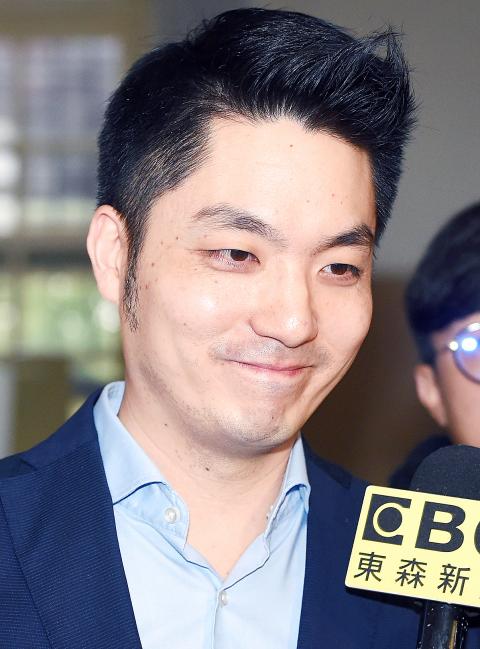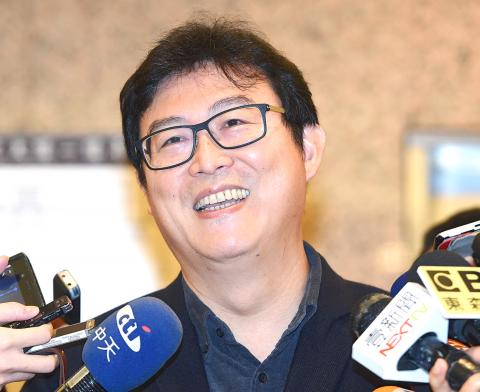Chinese Nationalist Party (KMT) Legislator Chiang Wan-an (蔣萬安) yesterday said that he would not seek the KMT’s nomination for the Taipei mayoral election in November.
“I never said that I would run. I will stay at the Legislative Yuan,” Chiang said.
He said that he would continue as KMT caucus convener for the legislature’s Social Welfare and Environmental Hygiene Committee to check and balance administrative power.

Photo: Liao Chen-huei, Taipei Times
He is to focus his attention on bills that address labor rights, air pollution and food safety when scrutinizing the ruling Democratic Progressive Party (DPP), he added.
Chiang said he decided to remain a legislator after the DPP this month pushed amendments to the Labor Standards Act (勞動基準法) through the legislature, rendering his efforts to review the amendments futile and degrading relevant agencies into “rubber stamps.”
Asked whether the KMT would appoint him as its Taipei mayoral candidate, forcing him to run, he said such a scenario is “out of the question.”

Photo: Liao Chen-huei, Taipei Times
Asked whether he would lend his support to KMT Taipei mayoral candidate hopeful Ting Shou-chung (丁守中), a former KMT legislator, Chiang said he would back anyone who emerges as the winner in the party’s primary.
He had made his position on the election clear to KMT Chairman Wu Den-yih (吳敦義), he added.
KMT caucus whip Lin Te-fu (林德福) said he respected Chiang’s decision.
KMT caucus deputy secretary-general William Tseng (曾銘宗) said he had high hopes for Chiang, but respected his decision.
It is unlikely that Chiang would be “drafted” by the KMT for the Taipei mayoral election, Tseng added.
Separately yesterday, Ting applauded Chiang for deciding to stay in the “battlefield” at the legislature.
“This is an act of shouldering responsibility that deserves recognition,” Ting said, adding that it would take party unity for the KMT to win back Taipei.
KMT Culture and Communications Committee director-general Lee Ming-hsien (李明賢) said he respected Chiang’s decision, adding that it would not affect the party’s plan to nominate someone through a primary who is most likely to win the election.
The nominations of all candidates for city mayor and county commissioner posts in November’s nine-in-one local elections would be based on public opinion polls, rather than surveys of only KMT members, Lee said.
The nomination process for Taipei and New Taipei City mayoral candidates is expected to begin after the Lunar New year holiday next month, he said.
DPP Legislator Pasuya Yao (姚文智), who is seeking the DPP’s nomination for Taipei mayoral candidate, said he was slightly disappointed by Chiang’s announcement.
It would be far more interesting if Chiang is in the race, Yao said.
Chiang’s decision was both graceful and a responsible move, as it allows the KMT to find other candidates in time, he added.
Additional reporting by Stacy Hsu and staff writer

CHAOS: Iranians took to the streets playing celebratory music after reports of Khamenei’s death on Saturday, while mourners also gathered in Tehran yesterday Iranian Supreme Leader Ayatollah Ali Khamenei was killed in a major attack on Iran launched by Israel and the US, throwing the future of the Islamic republic into doubt and raising the risk of regional instability. Iranian state television and the state-run IRNA news agency announced the 86-year-old’s death early yesterday. US President Donald Trump said it gave Iranians their “greatest chance” to “take back” their country. The announcements came after a joint US and Israeli aerial bombardment that targeted Iranian military and governmental sites. Trump said the “heavy and pinpoint bombing” would continue through the week or as long

TRUST: The KMT said it respected the US’ timing and considerations, and hoped it would continue to honor its commitments to helping Taiwan bolster its defenses and deterrence US President Donald Trump is delaying a multibillion-dollar arms sale to Taiwan to ensure his visit to Beijing is successful, a New York Times report said. The weapons sales package has stalled in the US Department of State, the report said, citing US officials it did not identify. The White House has told agencies not to push forward ahead of Trump’s meeting with Chinese President Xi Jinping (習近平), it said. The two last month held a phone call to discuss trade and geopolitical flashpoints ahead of the summit. Xi raised the Taiwan issue and urged the US to handle arms sales to

BIG SPENDERS: Foreign investors bought the most Taiwan equities since 2005, signaling confidence that an AI boom would continue to benefit chipmakers Taiwan Semiconductor Manufacturing Co’s (TSMC, 台積電) market capitalization swelled to US$2 trillion for the first time following a 4.25 percent rally in its American depositary receipts (ADR) overnight, putting the world’s biggest contract chipmaker sixth on the list of the world’s biggest companies by market capitalization, just behind Amazon.com Inc. The site CompaniesMarketcap.com ranked TSMC ahead of Saudi Aramco and Meta Platforms Inc. The Taiwanese company’s ADRs on Tuesday surged to US$385.75 on the New York Stock Exchange, as strong demand for artificial intelligence (AI) applications led to chip supply constraints and boost revenue growth to record-breaking levels. Each TSMC ADR represents

State-run CPC Corp, Taiwan (CPC, 台灣中油) yesterday said that it had confirmed on Saturday night with its liquefied natural gas (LNG) and crude oil suppliers that shipments are proceeding as scheduled and that domestic supplies remain unaffected. The CPC yesterday announced the gasoline and diesel prices will rise by NT$0.2 and NT$0.4 per liter, respectively, starting Monday, citing Middle East tensions and blizzards in the eastern United States. CPC also iterated it has been reducing the proportion of crude oil imports from the Middle East and diversifying its supply sources in the past few years in response to geopolitical risks, expanding